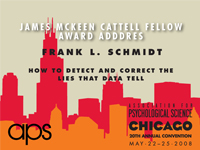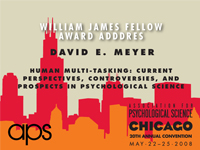Inside the Psychologist’s Studio: Daniel Kahneman
It’s not often that one gets to see the founder of a field up close and personal. But that was the rare treat enjoyed by those fortunate enough to attend the annual Inside the Psychologist Studio event at the APS 20th Annual Convention. Nobel Laureate and APS Fellow Daniel Kahneman talked to a riveted audience about the relationships between psychology, economics and policy; academic controversies and collaborations; and living a balanced life both personally and professionally. He was interviewed by longtime collaborator and fellow behavioral economics pioneer Richard Thaler of The University of Chicago.
Kahneman spent his childhood in Nazi-occupied Paris. At one point, his father was imprisoned, but, thankfully, was released several weeks later when his employer intervened. After the war, Kahneman and his family moved to Palestine (soon to become Israel). There, Kahneman received his Bachelors degree from Hebrew University and served a term in a psychological division of Israel Defense Forces. He moved to the United States to pursue graduate work at the University of California, Berkeley, earning his doctorate in 1961. “You can’t image how different [graduate school] is” today, Kahneman said. As he described it, there was an aura of intellectual freedom, there was no pressure to publish or even work extensively with one professor. Students were expected to know all of psychology. Jobs were obtained almost purely through recommendation, in what Kahneman recognized was an all-male network of psychologists.
While teaching a course on real world applications of psychology in 1968, Kahneman invited a young colleague named Amos Tversky to guest lecture. They clicked and worked together for the next decade and a half. Kahneman has collaborated his entire career and believes that working in this manner is a character trait. When you have “two people [like he and Tversky] who like to schmooze, gossip, and take long walks while they work, then it will happen.” Kahneman advised other researchers to try collaborating. “If you are the collaborative type,” he said, “than take the opportunity because it is so much more fun than working by yourself.” Sadly, Tversky passed away in 1996.
Among Kahneman and Tversky’s most well-known collaborations was the 1974 Science article “Judgment Under Uncertainty: Heuristics and Biases.” The controversy caused by that paper was one of the benchmarks of Kahneman’s career. Because it was seen as critical of rationality and the rational model, many economists rejected the paper outright. From Kahneman’s perspective, the piece was seen as “more important than [they] meant it to be. When a narrow piece is read as an important piece, it is misunderstood.” For example, some accused Kahneman and Tversky of not believing in social and emotional influences on behavior, because they were not mentioned in the paper. But, as he explained, they were simply left out because Kahneman and Tversky “had nothing important to say about them” and, not intending to write a definitive paper on the topic, they did not feel the need to cover every possible angle.
Although Kahneman and Tversky’s paper did challenge the most extreme version of the rational model — the idea that context and situation don’t matter in decision making — he said it was interpreted as much more encompassing and authoritative than it was. “So,” joked Thaler, “the rumor that you think people are blithering idiots, there’s no validity to that?” “Well, I have met some blithering idiots,” responded Kahneman wryly, “but our research was never about blithering idiots. We didn’t think the subjects were stupid, just human.”
Kahneman’s own experience with controversy, as well as a career of watching others experience the same thing, has convinced him that academic controversy is a waste of time. “Those in it waste time being angry,” he said, “and observers keep points like a boxing match. Very little is learned.” According to Kahneman, the idea that all authors of a paper should agree is “nonsensical” and only results in weaker papers. Authors should be able to disagree with each other and lay out issues in the discussion section. Instead of engaging in the reply-rejoinder model of debate found today, Kahneman advises that differing researchers should write a joint paper in which they collaborate to write a section about what they agree on and then write separate sections about the points they differ on.
Like divergent researchers, variant disciplines sometimes don’t play well together. But throughout his career, Kahneman has walked the line between psychology and economics. While Kahneman identifies as a psychologist, much of his work (and his Nobel Prize) is filed under behavioral economics. Thaler recalled that in the early days of the field, economists and psychologists worked jointly on behavioral economics research, but said that now it seems to him that fewer psychologists are involved. According to Kahneman, even though much decision-making research has migrated into economics departments and business schools, sometimes blurring professional identities of the researchers, it is still psychology.
Pragmatically, Kahneman understands the importance of the connection with economists, in part because they are viewed as “the policy gatekeepers” in a wide range of topics in the public arena, and under the guise of economics, this research gains credibility with policymakers. He’s willing to accept this for now, as long as psychologists can influence the economists. But, he added, as evidenced by the APS journal Psychological Science in the Public Interest, psychological research is ready to be applied to policy.
Kahneman’s most recent work has moved away from decision-making to focus on well-being, prompting Thaler to inquire whether this research has affected Kahneman’s own life. Does he take his own advice to make himself happier? Kahneman admitted that in many ways, happiness can be seen as a trait, and he said that it’s not one of his strong suits. Much of Kahneman’s work focuses on the contrast between actual mood during an experience and later judgments of the experience. Kahneman has always been someone who lived for the moment (Thaler doesn’t recall ever seeing him take a photograph), and his research has only strengthened his resolve to live for the moment. For many people, it seems like life is about composing memories. Planning a vacation often seems like planning a photo album. For Kahneman, like for all of us, life is a matter of balance. “How much do you do to maintain the narrative of your life and how much do you do to live?”
Towards the end of the interview, Thaler asked what Kahneman called “an ugly question” — what advice would Kahneman like to give to young scholars? His sage advice:— “You can overdo perseverance.” Kahneman has seen many students run into a line of research that wasn’t working, but continue on and write 30 pages about the topic. “You need to have the ability,” he said, “to recognize when what you are doing has some promise — the mere fact that you have a new word, that doesn’t do anything, but if you have a new phenomenon then you might be on to something.” In essence, stealing from Kahneman’s economist collaborators, ignore sunk costs.
The interview ended with the following exchange:
Thaler: Read a good book recently?
Kahneman: Dick Thaler wrote a book with Cass Sunstein. And it is a good book. It explains behavioral economics and the importance of behavioral economics in policy. And it illustrates the strange ways in which psychology does influence policy. But, basically, you never cite a single psychology thing.
Thaler: Oh, that’s not true. You appear on every third page.
Kahneman: Well, but I appear in my guise as an economist.
Thaler: You have no guise as an economist.
Daniel Kahneman apparently is a psychologist, through and through.
See more interviews with legends of psychological science here.




APS regularly opens certain online articles for discussion on our website. Effective February 2021, you must be a logged-in APS member to post comments. By posting a comment, you agree to our Community Guidelines and the display of your profile information, including your name and affiliation. Any opinions, findings, conclusions, or recommendations present in article comments are those of the writers and do not necessarily reflect the views of APS or the article’s author. For more information, please see our Community Guidelines.
Please login with your APS account to comment.